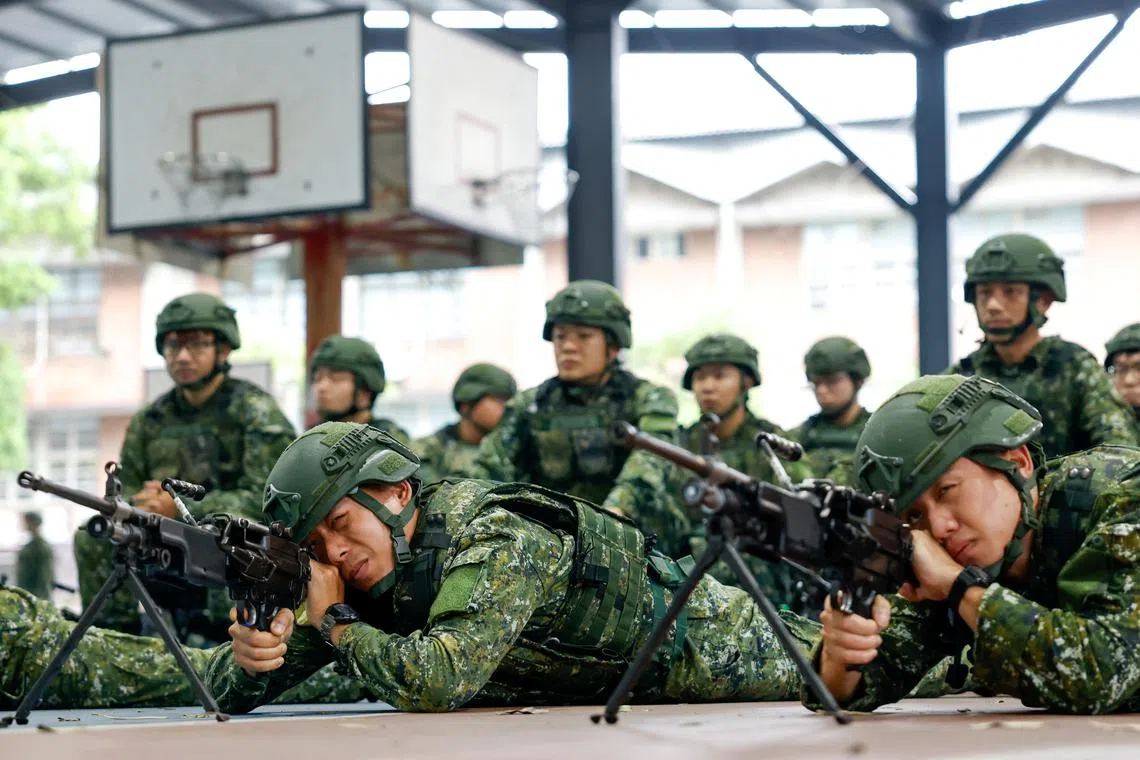Taiwan launches biggest war games with simulated attacks against military command
Sign up now: Get insights on Asia's fast-moving developments

Reservists receive training during the annual Han Kuang military exercises in Taoyuan, Taiwan, on July 9.
PHOTO: REUTERS
Follow topic:
TAIPEI - Taiwan on July 9 launched its largest military drills ever, starting with simulated attacks on its command systems and infrastructure ahead of a Chinese invasion, senior defence officials said.
The early stages of the annual Han Kuang exercises
Over the next 10 days, the drills will expand to assess Taiwan’s combat readiness against a full-scale attempt to seize the island.
“We are learning from the situation in Ukraine in recent years and realistically thinking about what Taiwan might face... in real combat,” said one senior defence official, highlighting the need to protect command and communication systems.
“Commanders have to think about what issues their troops might face, and they need to pass them down to their subordinates,” the official said, speaking on condition of anonymity due to the sensitivity of the operation.
Cyber attacks and misinformation campaigns are seen by Taiwan as high-intensity “grey zone” actions that are likely to precede a broader Chinese assault.
The annual Han Kuang exercises this year will mobilise the largest number of reservists, some 22,000, and for the first time feature new High Mobility Artillery Rocket Systems, or Himars, made by Lockheed Martin, along with Taiwan-developed Sky Sword surface-to-air missiles.
Some 300 reserve troops in Taoyuan city were seen moving into classrooms of a school emptied for summer holidays, receiving instruction in mortars and rifles.
China views democratically governed Taiwan as its own and has intensified military pressure around the island over the last five years, including through a string of war games.
Beijing has never renounced the use of force to bring the island under its control, and any attack on Taiwan could ignite a broader regional war.
Taiwanese defence officials said they believed that the Chinese military would be closely monitoring the drills.
By 6am, Taiwan had detected 31 Chinese aircraft sorties and seven naval ships, the Defence Ministry said in a statement.
Some 24 of the aircraft crossed the median line, the unofficial barrier between the two sides.
China’s Ministry of Commerce added eight Taiwan companies to its export control list, banning exports of dual-use products – which can be used for both civilian and military purposes – the state news agency Xinhua reported on July 9.
The list includes the Aerospace Industrial Development Corporation.
As they evolve, the drills will feature 24-hour army, naval and air operations to defend Taiwan’s coasts.
Civil defence elements will also be tested, including the creation of emergency supply stations, as well as the use of Taiwan’s recently expanded air-raid shelters.
Asked about the drills and Taiwan’s use of US-supplied Himars, Chinese Foreign Ministry spokeswoman Mao Ning said in Beijing on July 9 that “our opposition to US-Taiwan military ties is consistent and very firm”.
Taiwan’s “attempt to seek independence through force or relying on foreign (actors) will never succeed”, Ms Mao said.
China’s Defence Ministry said on July 8 that Taiwan’s Han Kuang military exercises were “nothing but a bluff”.
“No matter what weapons are used, Taiwan can’t resist the People’s Liberation Army’s sharp sword against independence,” its spokesman Jiang Bin was quoted as saying by state broadcaster CCTV.
A Taiwanese senior defence official said it wanted to show the international community that Taiwan was determined to defend itself.
Regional military attaches and analysts say the drills are being closely watched, both for China’s response and to gauge improvements in Taiwanese resilience.
Taiwan’s President Lai Ching-te and his government strongly object to China’s sovereignty claims, saying it is up to the island’s people to decide their future. REUTERS

